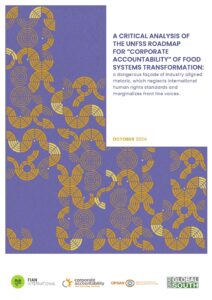10/10/2024
Under: Food Sovereignty and Agroecology, Publications, Reports
Ahead of the World Food Forum hosted by the Food and Agriculture Organization of the United Nations (FAO), FIAN International and partners call out a bogus UN corporate accountability initiative, which simply consolidates creeping corporate control over global food governance.
A new paper from FIAN International, Corporate Accountability, Focus on the Global South and the Food and Nutritional Policies Observatory of the University of Brasilia highlights the façade constructed by the UN Food Systems (UNFS) Coordination Hub which does nothing to tackle ongoing corporate capture of UN food transformation processes – including, ironically, those developed to hold corporations accountable for environmental and human rights abuses.
In June the UNFS Hub presented a roadmap to develop a corporate accountability framework for food systems transformation. This initiative goes back to the call to action presented by the UN Secretary General as an outcome of the 2023 UN Food Systems Summit (UNFSS), during which he identified several priority areas and notably: “promoting increased engagement of businesses, including through public-private partnerships, to shape the sustainability of food systems and establish and strengthen accountability mechanisms, recognizing their centrality for food systems”.
The unwillingness of the UN Secretary General to tackle unjust power relations in food systems at the first UNFSS in 2021 sparked a controversy that continues to this day.
The global food sovereignty movement has questioned both the strong involvement of the corporate sector in the preparation of that influential summit, and the subsequent prioritization of approaches aligned with corporate interests in the transformation of food systems – particularly the prominent role of digital technologies, to the detriment of policies that seek to reduce existing inequalities in food systems.
These concerns were expressed by the People’s Autonomous Response to the first UN Food Systems Summit. But it was not only civil society organizations and Indigenous Peoples who protested this corporate bias. Similar concerns have also been raised by scientists and researchers, as evidenced by statements of the International Panel of Experts on Sustainable Food Systems (IPES-Food) and the independent platform Healthy Societies, as well as by three UN Special Rapporteurs on Human Rights.
This latest initiative on corporate accountability is a bureaucratic smokescreen which distracts attention from the lack of any serious effort from the FAO and other UN bodies to address corporate accountability in food systems transformation.
Instead, the FAO and in particular the UN Committee on Food Security should actively support the process towards a Legally Binding Instrument on Transnational Companies and Other Businesses Enterprises with respect to Human Rights, which has been negotiated by the Human Rights Council over the last decade. That process includes civil society and should be given greater support and prominence in food system transformation discussions.
For more information contact Tom Sullivan [email protected]






